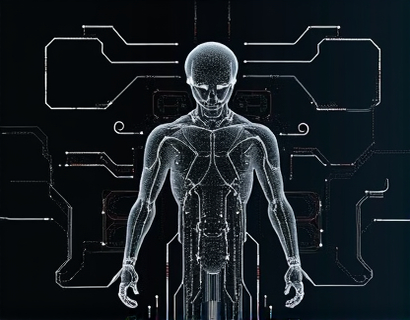AI Accreditation Innovations: Transforming Skill Validation and Career Advancement in the Digital Age
The digital age has ushered in a revolution in the way skills are validated and careers are advanced. With the rapid evolution of technology, particularly in artificial intelligence and machine learning, there is an increasing need for robust and recognized methods to validate an individual's expertise and knowledge. Traditional certification processes often fall short in keeping pace with these advancements, leading to a gap between acquired skills and industry recognition. This article explores the transformative impact of AI accreditation innovations, focusing on how specialized credentials can enhance professional credibility and open new doors in the tech industry.
The concept of AI accreditation is rooted in the need for a more dynamic and adaptive approach to skill validation. Unlike conventional certifications that may become outdated quickly, AI-driven accreditation platforms offer a flexible and continuous learning framework. These platforms utilize AI algorithms to assess and validate skills through a combination of completed tasks, educational milestones, and real-world applications. This approach not only ensures that the credentials remain relevant but also provides a comprehensive view of an individual's capabilities.
Personalized Learning Paths
One of the key innovations in AI accreditation is the ability to create personalized learning paths for individuals. AI algorithms analyze an individual's strengths, weaknesses, and career goals to curate a tailored educational journey. This personalized approach ensures that learners focus on areas that are most relevant to their professional development, thereby maximizing their learning efficiency and effectiveness. The AI system continuously updates the learning path based on the learner's progress, ensuring that the skills being developed are always aligned with current industry demands.
For instance, a tech professional looking to enhance their skills in natural language processing (NLP) can receive a customized curriculum that includes the latest courses, projects, and assessments in this field. The AI system tracks the learner's performance and adjusts the difficulty and focus of the tasks accordingly, providing a seamless and efficient learning experience. This level of personalization is unprecedented in traditional educational settings and significantly boosts the value of the acquired credentials.
Task-Based Validation
Traditional certifications often rely on theoretical knowledge assessed through exams, which may not accurately reflect a candidate's practical skills. In contrast, AI accreditation platforms focus on task-based validation, where skills are demonstrated through actual completion of tasks and projects. This method provides a more authentic assessment of an individual's abilities and ensures that the credentials are directly linked to real-world competencies.
For example, a candidate seeking certification in AI ethics can be assigned a project that involves analyzing and recommending ethical guidelines for AI systems in a given industry. The AI system evaluates the project based on predefined criteria, such as the depth of analysis, the relevance of recommendations, and the adherence to ethical standards. This task-based approach not only validates the candidate's understanding of ethical principles but also showcases their ability to apply these principles in practical scenarios.
Continuous Skill Assessment
AI accreditation platforms employ continuous skill assessment mechanisms to ensure that credentials remain up-to-date and reflective of an individual's current capabilities. Unlike static certifications that expire after a certain period, AI-driven credentials are dynamically maintained through ongoing assessments and re-evaluations. This continuous feedback loop ensures that the holder of the credential remains competent and competitive in their field.
The AI system periodically assigns new tasks and projects to assess the holder's skills, taking into account any changes in the industry or technology landscape. If a holder demonstrates proficiency in new areas or shows improvement in existing skills, the AI system updates the credential accordingly. This ongoing validation process not only enhances the credibility of the credential but also provides a clear and transparent record of the holder's skill progression.
Enhanced Job Prospects
The impact of AI accreditation on job prospects is significant. Employers in the tech industry increasingly seek candidates who can demonstrate specific, verifiable skills through recognized credentials. AI accreditation provides a standardized and widely accepted way to showcase these skills, making it easier for professionals to stand out in a competitive job market. The task-based and continuous nature of these credentials ensures that they are always relevant, thereby increasing the holder's employability.
Moreover, AI accreditation platforms often have partnerships with leading companies and organizations, which recognize and value these credentials. This recognition can lead to direct job opportunities or preferential consideration in the hiring process. For instance, a candidate with an AI accreditation in machine learning may be more likely to be shortlisted for a data scientist position compared to someone with only a general technology background.
Career Development and Advancement
Beyond job prospects, AI accreditation plays a crucial role in career development and advancement. Professionals can use these credentials to demonstrate their expertise and commitment to continuous learning, which are highly valued by employers and can lead to promotions and higher salaries. The detailed and transparent nature of AI-acquired credentials provides a clear narrative of an individual's career journey and skill evolution.
For example, a software developer who has obtained multiple AI accreditations in areas such as deep learning, computer vision, and natural language processing can compile a portfolio that showcases their specialized skills and achievements. This portfolio serves as a powerful tool for career advancement, enabling the professional to move into more senior roles or transition into new and emerging areas of the tech industry.
Industry Recognition and Standardization
The success of AI accreditation hinges on industry recognition and standardization. As more organizations adopt and value these credentials, the overall ecosystem benefits from a higher level of skill transparency and consistency. Standardization ensures that credentials across different platforms are comparable, allowing professionals to build a diverse and robust set of skills that are recognized across the industry.
Industry bodies and professional associations are increasingly collaborating with AI accreditation platforms to establish common standards and frameworks. This collaboration helps in creating a unified approach to skill validation, making it easier for professionals to navigate and advance their careers. The growing acceptance of AI accreditation by industry leaders underscores its potential to become a cornerstone of professional development in the digital age.
Challenges and Future Directions
Despite the numerous benefits, the adoption of AI accreditation is not without challenges. One of the primary concerns is ensuring the quality and integrity of the accreditation process. The AI systems must be robust and unbiased, providing fair and accurate assessments. Continuous monitoring and improvement of the AI algorithms are essential to maintain the credibility of the credentials.
Another challenge is the need for widespread industry adoption. While some leading companies recognize AI accreditation, broader acceptance is necessary to maximize its impact. Educational institutions, governments, and professional organizations must also play a role in integrating AI accreditation into their frameworks and policies.
Looking ahead, the future of AI accreditation is promising. Advancements in AI technology will likely lead to even more sophisticated and personalized learning experiences. The integration of blockchain technology can enhance the security and transparency of credential storage and verification. Additionally, the expansion of AI accreditation to non-tech fields, such as healthcare and finance, can further broaden its applicability and impact.
In conclusion, AI accreditation represents a significant innovation in skill validation and career advancement. By offering personalized, task-based, and continuously assessed credentials, these platforms empower individuals to demonstrate their expertise and stay ahead in the rapidly evolving tech landscape. As the digital age continues to transform the job market, AI accreditation will play an increasingly vital role in ensuring that professionals can effectively validate their skills and achieve their career goals.










































